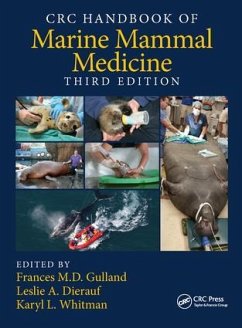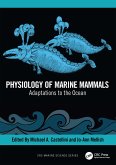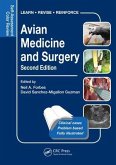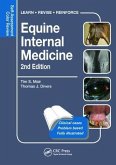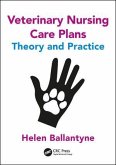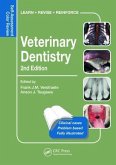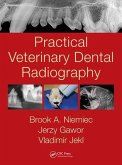CRC Handbook of Marine Mammal Medicine
Herausgeber: Gulland, Frances M. D.; Dierauf, Leslie A.; Whitman, Karyl L.
CRC Handbook of Marine Mammal Medicine
Herausgeber: Gulland, Frances M. D.; Dierauf, Leslie A.; Whitman, Karyl L.
- Gebundenes Buch
- Merkliste
- Auf die Merkliste
- Bewerten Bewerten
- Teilen
- Produkt teilen
- Produkterinnerung
- Produkterinnerung
This new edition provides a thorough and international approach to the husbandry, diseases, and environmental and political issues relating to marine mammal health and well-being. It covers all aspects of disease and health in cetaceans, pinnipeds, manatees, sea otters, and polar bears.
Andere Kunden interessierten sich auch für
![Physiology of Marine Mammals Physiology of Marine Mammals]() Physiology of Marine Mammals77,99 €
Physiology of Marine Mammals77,99 €![Avian Medicine and Surgery Avian Medicine and Surgery]() Avian Medicine and Surgery62,99 €
Avian Medicine and Surgery62,99 €![Equine Internal Medicine Equine Internal Medicine]() Tim S. Mair (UK Bell Equine Veterinary Clinic)Equine Internal Medicine61,99 €
Tim S. Mair (UK Bell Equine Veterinary Clinic)Equine Internal Medicine61,99 €![Veterinary Cytology Veterinary Cytology]() Veterinary Cytology61,99 €
Veterinary Cytology61,99 €![Veterinary Nursing Care Plans Veterinary Nursing Care Plans]() Helen BallantyneVeterinary Nursing Care Plans63,99 €
Helen BallantyneVeterinary Nursing Care Plans63,99 €![Veterinary Dentistry Veterinary Dentistry]() Frank Verstraete (University of California, Davis, USA)Veterinary Dentistry60,99 €
Frank Verstraete (University of California, Davis, USA)Veterinary Dentistry60,99 €![Practical Veterinary Dental Radiography Practical Veterinary Dental Radiography]() Brook A. Niemiec (Southern California Veterinary Dental SpecialtiesPractical Veterinary Dental Radiography130,99 €
Brook A. Niemiec (Southern California Veterinary Dental SpecialtiesPractical Veterinary Dental Radiography130,99 €-
-
-
This new edition provides a thorough and international approach to the husbandry, diseases, and environmental and political issues relating to marine mammal health and well-being. It covers all aspects of disease and health in cetaceans, pinnipeds, manatees, sea otters, and polar bears.
Hinweis: Dieser Artikel kann nur an eine deutsche Lieferadresse ausgeliefert werden.
Hinweis: Dieser Artikel kann nur an eine deutsche Lieferadresse ausgeliefert werden.
Produktdetails
- Produktdetails
- Verlag: Taylor & Francis Inc
- 3 ed
- Seitenzahl: 1144
- Erscheinungstermin: 23. Mai 2018
- Englisch
- Abmessung: 284mm x 225mm x 53mm
- Gewicht: 3326g
- ISBN-13: 9781498796873
- ISBN-10: 1498796877
- Artikelnr.: 50484123
- Herstellerkennzeichnung
- Libri GmbH
- Europaallee 1
- 36244 Bad Hersfeld
- gpsr@libri.de
- Verlag: Taylor & Francis Inc
- 3 ed
- Seitenzahl: 1144
- Erscheinungstermin: 23. Mai 2018
- Englisch
- Abmessung: 284mm x 225mm x 53mm
- Gewicht: 3326g
- ISBN-13: 9781498796873
- ISBN-10: 1498796877
- Artikelnr.: 50484123
- Herstellerkennzeichnung
- Libri GmbH
- Europaallee 1
- 36244 Bad Hersfeld
- gpsr@libri.de
Leslie Dierauf, V.M.D. is a retired wildlife veterinarian, having pursued a successful and unique professional career in a variety of venues. Most recently, from 2008-2011, Leslie served in a federal agency capacity, as the senior executive Pacific Northwest Regional Director, and prior to that as the Director of the National Wildlife Health Center for the US Department of the Interior's US Geological Survey (USGS). Between 1994 and 2004, Leslie worked for the US Fish and Wildlife Service in the Southwestern US, primarily with local communities in NM, AZ, TX and OK, working together to create land, water and development plans while protecting a multitude of threatened and endangered species through habitat conservation plans and the Mexican gray wolf reintroduction program. In 1990, Leslie was honored with a Congressional Science Fellowship from the American Association for the Advancement of Science; following that year in Washington, DC, she continued to work for three years as a Science Advisor to the US House of Representatives, primarily on marine and aquatic policy, as well as fish and wildlife conservation. She was instrumental in drafting and then helping pass Title IV of the Marine Mammal Protection Act, placing responsibility on the National Marine Fisheries Service and the US Fish and Wildlife Service for unusual mortality events (UMEs) in marine mammals. Before joining Federal service, Leslie practiced marine mammal medicine as the California Marine Mammal Center's Chief of Veterinary Services in Sausalito, CA, and emergency medicine as staff veterinarian for the Marin County Small Animal Emergency Clinic in San Rafael, CA. She has served as the President of the International Association for Aquatic Animal Medicine, and co-edited and authored two previous editions of CRC Press's Handbook of Marine Mammal Medicine: Health, Disease and Rehabilitation (1990 and 2001) Currently Leslie lives in West Seattle, WA (overlooking the Salish Sea), with her husband Jim, and serves on the Boards of SeaLife Response, Rehabilitation and Research (SR3) and the SeaDoc Society, both marine ecosystem health public/private nonprofits. Frances M. D. Gulland, Vet MB, PhD, MRCVS is a veterinarian at The Marine Mammal Center in Sausalito, California. She has been actively involved in the veterinary care and rehabilitation of stranded marine mammals and research into marine mammal diseases there since 1994. Her interests include determining the impacts of human activities on marine mammal health, and how marine mammals can in turn serve as indicators of ocean health. She received a veterinary degree from the University of Cambridge, U.K., in 1984, and a PhD in Zoology there in 1991. She currently serves as Commissioner on the U. S. Marine Mammal Commission. Karyl L. Whitman, Ph.D is a wildlife behavioral ecologist interested in applied ecology and mitigating human effects on wildlife. She received a B.A. in Archaeology and Anthropology from Rutgers University. As a John D. and Catherine T. MacArthur Fellow, Karyl received her Ph.D. in Ecology, Evolution, and Behavior from the University of Minnesota in 2006 under the direction of Dr. Craig Packer. Her research modelled the effects of trophy hunting and developed a new method to non-invasively age African lions that has been instrumental in reforming the hunting industry across several African states. She has studied a variety of East Africa wildlife, however more recently she assists with field research of California sea lions and northern fur seals in California. Karyl serves as a scientific advisor on the African Lion Working Group and to the Serengeti Lion Project. She currently lives in Seattle with her four children and husband, Tom Gelatt, who is the real marine mammal biologist in the family.
Preface. Climate change, regional issues. Global Marine Mammal Health
Concerns. Stranding networks and response. Oil spill response and effects.
Whale entanglement response and diagnosis. Zoonoses and public health.
Ethics and animal welfare. Anatomy and Physiology. Overview of dive
responses. Anatomy. Endocrinology. Stress. Reproduction.
Immuno-diagnostics. Genetics. Pathology. Gross necropsy and specimen
collection. Non infectious diseases. (update plus noise, gas bubble
disease, freshwater disease). General toxicology. Biotoxicoses. Infectious
Diseases. Viruses. Bacteria. Mycoses. Protozoa. Helminths and Arthropods.
Medicine, Anesthesia and Surgery. Dentistry. Ophthalmology. Diagnostic
Imaging. Endoscopy. Anesthesia. Pharmaceuticals and Formularies.
Euthanasia. Husbandry. Nutrition and energetics. Hand rearing and
artificial milk formulas. Environmental considerations. Tagging and
tracking. Transport. Health Assessment (How to examine, collect blood,
urine, csf, feces, breath, photogrammetry, biopsy). Whales. Dolphins.
Pinniped. Walruses. Sirenians. Polar bears. Species Specific Medicine (with
blood values, clin path changes with relevant diseases). Cetaceans. Seals
and sea lions. Walruses. Sirenia. Otters. Polar bears. Appendices.
Conversions. Abbreviations.
Concerns. Stranding networks and response. Oil spill response and effects.
Whale entanglement response and diagnosis. Zoonoses and public health.
Ethics and animal welfare. Anatomy and Physiology. Overview of dive
responses. Anatomy. Endocrinology. Stress. Reproduction.
Immuno-diagnostics. Genetics. Pathology. Gross necropsy and specimen
collection. Non infectious diseases. (update plus noise, gas bubble
disease, freshwater disease). General toxicology. Biotoxicoses. Infectious
Diseases. Viruses. Bacteria. Mycoses. Protozoa. Helminths and Arthropods.
Medicine, Anesthesia and Surgery. Dentistry. Ophthalmology. Diagnostic
Imaging. Endoscopy. Anesthesia. Pharmaceuticals and Formularies.
Euthanasia. Husbandry. Nutrition and energetics. Hand rearing and
artificial milk formulas. Environmental considerations. Tagging and
tracking. Transport. Health Assessment (How to examine, collect blood,
urine, csf, feces, breath, photogrammetry, biopsy). Whales. Dolphins.
Pinniped. Walruses. Sirenians. Polar bears. Species Specific Medicine (with
blood values, clin path changes with relevant diseases). Cetaceans. Seals
and sea lions. Walruses. Sirenia. Otters. Polar bears. Appendices.
Conversions. Abbreviations.
Preface. Climate change, regional issues. Global Marine Mammal Health
Concerns. Stranding networks and response. Oil spill response and effects.
Whale entanglement response and diagnosis. Zoonoses and public health.
Ethics and animal welfare. Anatomy and Physiology. Overview of dive
responses. Anatomy. Endocrinology. Stress. Reproduction.
Immuno-diagnostics. Genetics. Pathology. Gross necropsy and specimen
collection. Non infectious diseases. (update plus noise, gas bubble
disease, freshwater disease). General toxicology. Biotoxicoses. Infectious
Diseases. Viruses. Bacteria. Mycoses. Protozoa. Helminths and Arthropods.
Medicine, Anesthesia and Surgery. Dentistry. Ophthalmology. Diagnostic
Imaging. Endoscopy. Anesthesia. Pharmaceuticals and Formularies.
Euthanasia. Husbandry. Nutrition and energetics. Hand rearing and
artificial milk formulas. Environmental considerations. Tagging and
tracking. Transport. Health Assessment (How to examine, collect blood,
urine, csf, feces, breath, photogrammetry, biopsy). Whales. Dolphins.
Pinniped. Walruses. Sirenians. Polar bears. Species Specific Medicine (with
blood values, clin path changes with relevant diseases). Cetaceans. Seals
and sea lions. Walruses. Sirenia. Otters. Polar bears. Appendices.
Conversions. Abbreviations.
Concerns. Stranding networks and response. Oil spill response and effects.
Whale entanglement response and diagnosis. Zoonoses and public health.
Ethics and animal welfare. Anatomy and Physiology. Overview of dive
responses. Anatomy. Endocrinology. Stress. Reproduction.
Immuno-diagnostics. Genetics. Pathology. Gross necropsy and specimen
collection. Non infectious diseases. (update plus noise, gas bubble
disease, freshwater disease). General toxicology. Biotoxicoses. Infectious
Diseases. Viruses. Bacteria. Mycoses. Protozoa. Helminths and Arthropods.
Medicine, Anesthesia and Surgery. Dentistry. Ophthalmology. Diagnostic
Imaging. Endoscopy. Anesthesia. Pharmaceuticals and Formularies.
Euthanasia. Husbandry. Nutrition and energetics. Hand rearing and
artificial milk formulas. Environmental considerations. Tagging and
tracking. Transport. Health Assessment (How to examine, collect blood,
urine, csf, feces, breath, photogrammetry, biopsy). Whales. Dolphins.
Pinniped. Walruses. Sirenians. Polar bears. Species Specific Medicine (with
blood values, clin path changes with relevant diseases). Cetaceans. Seals
and sea lions. Walruses. Sirenia. Otters. Polar bears. Appendices.
Conversions. Abbreviations.

